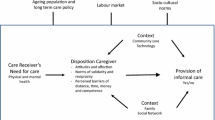Abstract
The purpose of this paper is to describe the structure and functioning of informal caregiving systems of community-based chronically mentally ill individuals. From a sample of 409 family member reports, 150 caregiving systems are described in terms of size, composition and division of caregiving labor. Results show that these systems are about as large as those found for elder caregiving systems, that women and relatives predominate as caregivers, that there is considerable diversity in the types of caregivers and that size and composition are related to the division of labor observed in these systems.
Similar content being viewed by others
References
Bass, D.M., Tausig, M. & Noelker, L.S. (1988/89). “Elder Impairment, Social Support and Care-giver Strain: A Framework for Understanding Support's Effects,”,The Journal of Applied Social Sciences 13:80–117.
Bowman, K., Cosby, J. & Stull, D.E. (1989). “The Diversity of Family Caregiving Arrangements and Involvement.” Presented at the 42nd annual meeting of theGerontological Society of America, Minneapolis, MN.
Cantor, M.H. (1983), “Strain Among Caregivers: A Study of Experience in the United States.”The Gerontologist 23 (6):597–604.
Fisher, G.A. & Tessler, R.C. (1991). “The Community Support Networks of the Mentally Ill.” Unpublished manuscript, Social and Demographic Research Institute, University of Massachusetts.
Horowitz, A. & Dobrof, R. (1982). “The Role of Families in Providing Long Term Care to the Frail and Chronically Ill Elderly Living in the Community: Final Report,”Health Care Financing Administration, Grant No. 18-P-97541/20-02. New York: Brookdale Center on Aging.
Lefley, H.M. (1987), “Aging Parents as Caregivers of Mentally Ill Adult Children: An Emerging Social Problem,”Hospital and Community Psychiatry 38(10):1063–1070.
Litwak, E. (1985).Helping the Elderly: The Complementary Roles of Informal Networks and Formal Systems. New York: Guilford Press.
Matthews, S.H. & Rosner, T.T. (1988). “Shared Filial Responsibility: The Family as Primary Caregiver.“Journal of Marriage and the Family 50:185–195.
Noelker, L.S. & Wallace, R.W. (1985). “The Organization of Family Care for Impaired Elderly.”Journal of Family Issues 6 (1):23–44.
NORC, National Opinion Research Center. (1985). “The General Social Survey, 1985.” Chicago.
Pattison, E.M., DeFrancisco, D., Wood, P., Frazier, H. & Crowder, J. (1975). “A Psychosocial Kinship Model for Family Therapy.”American Journal Psychiatry, 132 (12):1246–1251.
Shanas, E. (1979). “The Family as a Social Support System in Old Age.”The Gerontologist 19:169–174.
Sokolovsky, J., Cohen, C., Berger, D. & Geiger, J. (1978). “Personal Networks of Ex-mental Patients in the Inner City.”Human Organization 37:5–15.
Stone, R., Cafferata, G.L. & Sangl, J. (1987). “Caregivers of the Frail Elderly: A National Profile.”The Gerontologist 27:616–626.
Tennstedt, S.L., McKinlay, J.B. & Sullivan, L.M. (1989). “Informal Care for Frail Elders: The Role of Secondary Caregivers.”The Gerontologist 29:677–683.
Tessler, R.C., Gamache, G. & Fisher, G.A. (1991). “Patterns of Contact of Patients' Families With Mental Health Professionals and Attitudes Toward Professionals.”Hospital and Community Psychiatry 42:929–935.
Tolsdorf, C.C. (1976). “Social Networks, Support, and Coping: An Exploratory Study.”Family Process 15:407–418.
Author information
Authors and Affiliations
Additional information
The sample from which the data were obtained was provided from the Community Care Study of the National Evaluation of the Robert Wood Johnson Foundation Program on Chronic Mental Illness (Howard H. Goldmann, Principal Investigator). Data were obtained through a grant from NIMH to Drs. Richard Tessler and Gene Fisher. The analysis was funded by the Ohio Department of Mental Health, Office of Program Evaluation and Research.
Rights and permissions
About this article
Cite this article
Tausig, M., Fisher, G.A. & Tessler, R.C. Informal systems of care for the chronically mentally ill. Community Ment Health J 28, 413–425 (1992). https://doi.org/10.1007/BF00761059
Issue Date:
DOI: https://doi.org/10.1007/BF00761059




